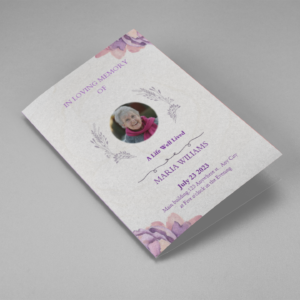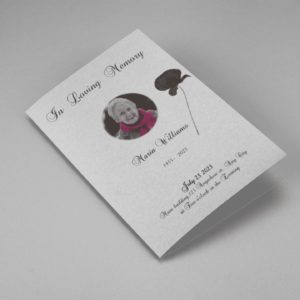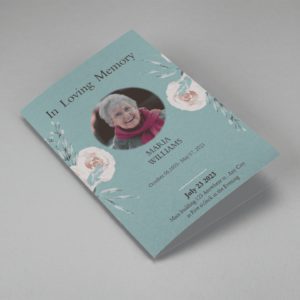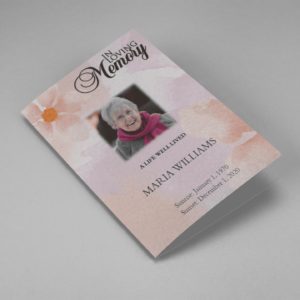THE FIRST BIG DECISION
The first decision one arrives at when planning a funeral is how the remains of the deceased will be handled. Whether you select burial or cremation is a matter of personal conviction. Burial also involves the procurement of a cemetery plot — something that some but not all funeral providers can do for you. Burial offers mourners a chance to visit a physical location to come for remembrance, while cremation offers the ability to keep a deceased loved one close by in an urn or a keepsake. Some planners choose to do a combination cremation, with some ashes kept in urns for relatives and others buried in a special place to visit.
HONORING A LIFE
When someone passes away, the funeral service is usually the most prominent outward projection of their legacy and what their life meant to their loved ones. To be true to the life of the deceased, whether planning for yourself in the future or someone who has already passed away, think about what made that person special. Consider their passions, work, and hobbies. Try to make the funeral service reflect the most important parts of their character. Funeral providers have grown extremely skilled in helping to customize the proceedings to reflect the deceased’s unique personality.
THE COMPONENTS OF A FUNERAL
Funerals are increasingly customized and can include any number of readings, pieces of music, clips of video, photo slideshows, etc. It all comes down to two basic parts, however. People can choose to do one or the other, or both. First, a viewing or visitation occurs before the funeral service and is often held at a funeral home. They are often fairly unstructured, centering on the conversation.
Visitation or viewing is traditionally a chance for all those whose lives were touched by the deceased to come to say goodbye and comfort the grieving. Second, the funeral service, which is traditionally a more formal occasion than the visitation or viewing and has a more structured program.
Funeral services are often held in places of worship. They may feature a eulogy, words from a faith leader, readings from sacred or secular texts, music, and other elements to help honor the life of the deceased.
-
Searching for a Oak Leaf With Gold Oval Frame Half Page Funeral Program that is easy to print and amass and has a cutting-edge look? The Oak Leaf With Gold Oval Frame Half Page Funeral Program is the Perfect decision because it measures 8.5”x 5.5”.
- No Limitation on Content, Edit anything
- Edit anytime – unlimited revisions even after purchased
- Get a printable PDF downloaded to get it printed on your own.
-
Searching for a Brown and White Classic Funeral Program Half Page Program that is easy to print and amass and has a cutting-edge look? The Brown and White Classic Funeral Program Half Page Program is the Perfect decision because it measures 8.5”x 5.5”.
- No Limitation on Content, Edit anything
- Edit anytime – unlimited revisions even after purchased
- Get a printable PDF downloaded to get it printed on your own.
-
Searching for a Purple Elegant Watercolor Half Page Funeral Program Template that is easy to print and amass and has a cutting-edge look? The Purple Elegant Watercolor Half Page Funeral Program Template is the Perfect decision because it measures 8.5”x 5.5”.
- No Limitation on Content, Edit anything
- Edit anytime – unlimited revisions even after purchased
- Get a printable PDF downloaded to get it printed on your own.
-
Searching for a Cream and Green Photo Obituary Half Page Program that is easy to print and amass and has a cutting-edge look? The Cream and Green Photo Obituary Half Page Program is the Perfect decision because it measures 8.5”x 5.5”.
- No Limitation on Content, Edit anything
- Edit anytime – unlimited revisions even after purchased
- Get a printable PDF downloaded to get it printed on your own.
-
Searching for a Cream Simple Elegant Photo Church Half Page Program that is easy to print and amass and has a cutting-edge look? The Cream Simple Elegant Photo Church Half Page Program is the Perfect decision because it measures 8.5”x 5.5”.
- No Limitation on Content, Edit anything
- Edit anytime – unlimited revisions even after purchased
- Get a printable PDF downloaded to get it printed on your own.
-
Searching for a Samovar Silver Half Page Funeral Program Template that is easy to print and amass and has a cutting-edge look? The Samovar Silver Half Page Funeral Program Template is the Perfect decision because it measures 8.5”x 5.5”.
- No Limitation on Content, Edit anything
- Edit anytime – unlimited revisions even after purchased
- Get a printable PDF downloaded to get it printed on your own.
-
Searching for an Elegant Beige Half Page Funeral Program Template that is easy to print and amass and has a cutting-edge look? The Elegant Beige Half-Page Funeral Program Template is the Perfect decision because it measures 8.5”x 5.5”.
- No Limitation on Content, Edit anything
- Edit anytime – unlimited revisions even after purchased
- Get a printable PDF downloaded to get it printed on your own.
-
Searching for a White Floral Pro Half Page Funeral Program Template that is easy to print and amass and has a cutting-edge look? White Floral Pro Half Page Funeral Program Template is the Perfect decision because it measures 8.5”x 5.5”.
- No Limitation on Content, Edit anything
- Edit anytime – unlimited revisions even after purchased
- Get a printable PDF downloaded to get it printed on your own.
-
Searching for a Grey and Burgundy Elegant Half Page Funeral Program Template that is easy to print and amass and has a cutting-edge look? Grey and Burgundy Elegant Half Page Funeral Program Template is the Perfect decision because it measures 8.5”x 5.5”.
- No Limitation on Content, Edit anything
- Edit anytime – unlimited revisions even after purchased
- Get a printable PDF downloaded to get it printed on your own.
-
Searching for a Soft Green and Grey Minimalist Floral Half Page Funeral Program Template that is easy to print and amass and has a cutting-edge look? Soft Green and Grey Minimalist Floral Half Page Funeral Program Template is the Perfect decision because it measures 8.5”x 5.5”.
- No Limitation on Content, Edit anything
- Edit anytime – unlimited revisions even after purchased
- Get a printable PDF downloaded to get it printed on your own.
-
Searching for a Gray Elegant Oval Frame Half Page Funeral Program Template that is easy to print and amass and has a cutting-edge look? Gray Elegant Oval Frame Half Page Funeral Program Template is the Perfect decision because it measures 8.5”x 5.5”.
- No Limitation on Content, Edit anything
- Edit anytime – unlimited revisions even after purchased
- Get a printable PDF downloaded to get it printed on your own.
-
Searching for a Blue Organic Minimal Half Page Funeral Program Template that is easy to print and amass and has a cutting-edge look? Blue Organic Minimal Half Page Funeral Program Template is the Perfect decision because it measures 8.5”x 5.5”.
- No Limitation on Content, Edit anything
- Edit anytime – unlimited revisions even after purchased
- Get a printable PDF downloaded to get it printed on your own.
-
Searching for a Pink and Orange Watercolour Half Page Funeral Program Template that is easy to print and amass and has a cutting-edge look? Pink and Orange Watercolour Half Page Funeral Program Template is the Perfect decision because it measures 8.5”x 5.5”.
- No Limitation on Content, Edit anything
- Edit anytime – unlimited revisions even after purchased
- Get a printable PDF downloaded to get it printed on your own.
-
Searching for a Pink Floral Paper Half Page Funeral Program Template that is easy to print and amass and has a cutting-edge look? Pink Floral Paper Half Page Funeral Program Template is the Perfect decision because it measures 8.5”x 5.5”.
- No Limitation on Content, Edit anything
- Edit anytime – unlimited revisions even after purchased
- Get a printable PDF downloaded to get it printed on your own.
TIMING AND LOCATION
Generally, funeral services are held within a few days after death. Flexibility may be necessary to accommodate the schedule of your preferred venue for a visitation/viewing or funeral service or to enable traveling friends and family sufficient time to arrange for their attendance. The choice of location depends very much on the type of service. If the service will be religious, it will likely be held in a place of worship. If it celebrates a nature-lover, perhaps the outdoors is most appropriate. Some mourners arrange to hold the service at their homes. The choice of venue is important as a reflection of the values and personality of the deceased.
CHOOSING YOUR PROVIDER
Thanks to QuickFuneral.com, it’s easy to compare several providers in an area and select the best fit for your service and budget. You may wish to stay with a funeral home that your family has used for generations, or you may want to research different providers extensively.
COMMUNICATING WITH YOUR FAMILY
Whether you are prearranging a funeral for yourself or a loved one or arranging an imminent funeral for someone who passed away recently, communicate your plans to family members. They will want to be aware of your plans and will likely offer helpful suggestions and shoulder some of the logistical workloads.















